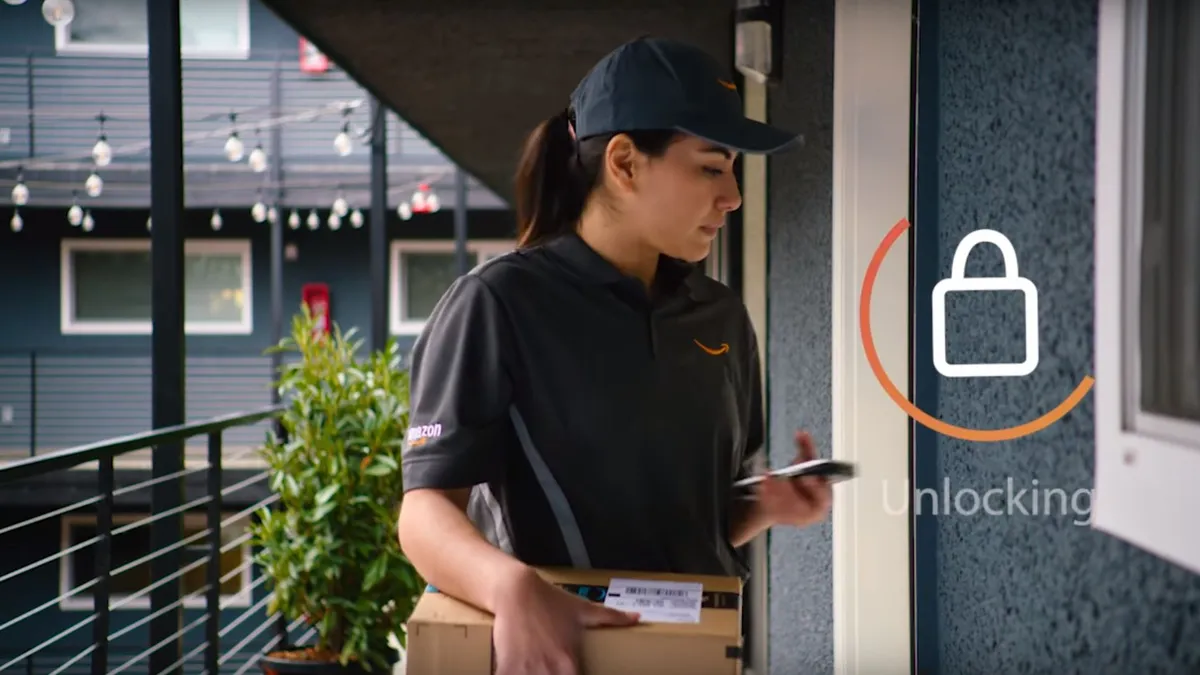Dive Brief:
- Amazon Key, the online retailer’s in-home delivery service launched last November, is a wildly unpopular concept so far, with 75.9% of women unwilling to use it, and 60.9% of men – a 68.8% average for all, according to a study by InsuranceQuotes. The numbers are not much better for Prime members with 34.3% saying they are willing to use Amazon Key. This contrasts with 63.7% who trust Amazon in general, versus 53% for Google and 27.9% for Facebook.
- Almost 80% said they are afraid that Amazon Key couriers will steal something from their homes, breaking down as 80.4% women and 78.4% men. A breach of privacy is another major concern for 76.9% of women and 69.9% of men. This is followed by malicious exploitation of the Amazon Key program by 61.8% of women and 56.2% of men. The InsuranceQuotes study was titled, “Open Door to Delivery.”
- Amazon Key is intended to help solve a big problem for the retailer, as more than 20% of Americans had a delivered package stolen. The number is greater for Prime members, who tend to order more frequently from Amazon, than non-Prime members, 23.4% to 18.6%.
Dive Insight:
Theft of packages and keeping food products fresh and frozen are two major concerns for home delivery services of online retail, but new solutions that involve allowing authorized personnel into the home have not impressed consumers. Security concerns remain top-of-mind, according to this study of 567 men and 445 women, with an average age of 35. The study was intended to measure intent to use Amazon Key, and not to survey people who have used it.
Amazon is not alone in seeking access to homes. Walmart has partnered with Deliv and August Locks, a "smart locks" company, in testing a service that delivers food products inside customers' homes, and putting away fresh and frozen products in refrigerators and freezers when people are not home. Although this addresses a long-standing obstacle to home delivery — how to keep fresh and frozen food cold — there’s no reason to think this service will be any more popular than Amazon’s at this time.
Among other findings of the survey, renters are more likely than home owners to accept Amazon Key, by 34.3% to 29.1%. In a curious gender-related twist, women were more concerned about the courier making a judgment about the home than men, 35.1% to 23.9%, while men were more concerned about the deliverer setting off or disabling security systems than women, 20.5% to 19.6%.
Amazon Prime members in 37 cities can sign up for the program, which involves the purchase of a $250 kit, which includes an app, an indoor security camera and a smart lock, according to Quoted, a publication of The Zebra, a car insurance comparison site.
There are three major concerns about Amazon Key, Quoted said. One is theft, because while the camera, lock and app can keep couriers from stealing on the delivery trip, it can’t keep them from looking around with an eye to a future theft. Two is pets, who might either escape or harass the courier. Three is hacks, and ultimately theft, where the camera might be disabled. Quoted also conducted a Twitter poll, and of 2,109 votes, 79% said they would not sign up for Amazon Key, and the remainder expressed some degree of interest.
Amazon has other options for secure package delivery, both involving pickup. One is at dedicated Amazon pickup locations, which are actual store fronts. Another is Amazon Locker in other retailers’ locations, including 7-Eleven and, because of last year’s acquisition by Amazon, Whole Foods Markets. Deliveries requiring a signature cannot be sent to an Amazon Locker.
Walmart is expanding grocery pickup to many of its approximately 5,000 U.S. locations, and intends to offer the service in 100 markets by the end of the year, reaching 40% of U.S. households. Whole Foods and Walmart stores have the capability to keep fresh and frozen orders refrigerated. Other options include taking a box at the U.S. Postal Service or at a UPS Store. UPS Stores accept all packages for box holders, while the post office can only accept those from the U.S. Parcel Service or FedEx.






